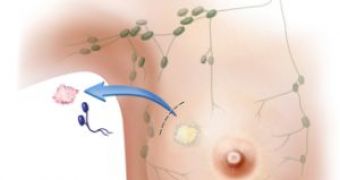Scientists have announced that they have developed a new type of blood test that is going to detect very early signs of breast cancer. The American Chemical Society's Journal of Proteome Research also stated that this blood test might also be very helpful in tracking down early stages of other types of cancer, such as skin, ovarian or prostate cancer.
Breast examination, imaging with mammography and ultrasonography and biopsy methods are currently available for women to test their breath and identify possible problems. However, if the blood test proves further to be efficient, it could successfully replace more difficult open biopsy.
The new technique based on a blood test has been developed by a multinational research team including scholars from the University of Pennsylvania and Pittsburg and also scientists from the BioTraces Inc. Company from Virginia. The research is led by Professor Jasminka Godovac-Zimmermann from University College London.
The pilot test was conducted on 345 women who had been taken the blood test. Test results correctly detected 95% of breast cancers and failed to track down only 5% of the specific cancer early signs. The blood test is based on scanning and measuring a large amount of proteins in the body in order to discover a typical fingerprint of breast cancer. The blood test developed by the research team aims at detecting the smallest changes that occur in the concentrations of blood proteins.
Breast cancer is the most popular form of cancer among women worldwide. It can be treated, but it all depends on the stage at which it is tracked down and diagnosed. The sooner, the better! Therefore, a new method that would detect earlier signs of breast cancer was needed. The pilot study that investigated how the new blood test works seems to be a successful technique. However, further trials are needed until the blood test can be performed on female population.
"Our pilot studies show that using blood samples, breast cancer and several other types of epithelial cancers can be detected with much better sensitivity and specificity. This may allow new, less intrusive, safer and much less expensive approaches for the early diagnosis of cancer, for distinguishing malignant and benign cancers, and for monitoring cancer therapy," explained Professor Jasminka Godovac-Zimmermann.

 14 DAY TRIAL //
14 DAY TRIAL //